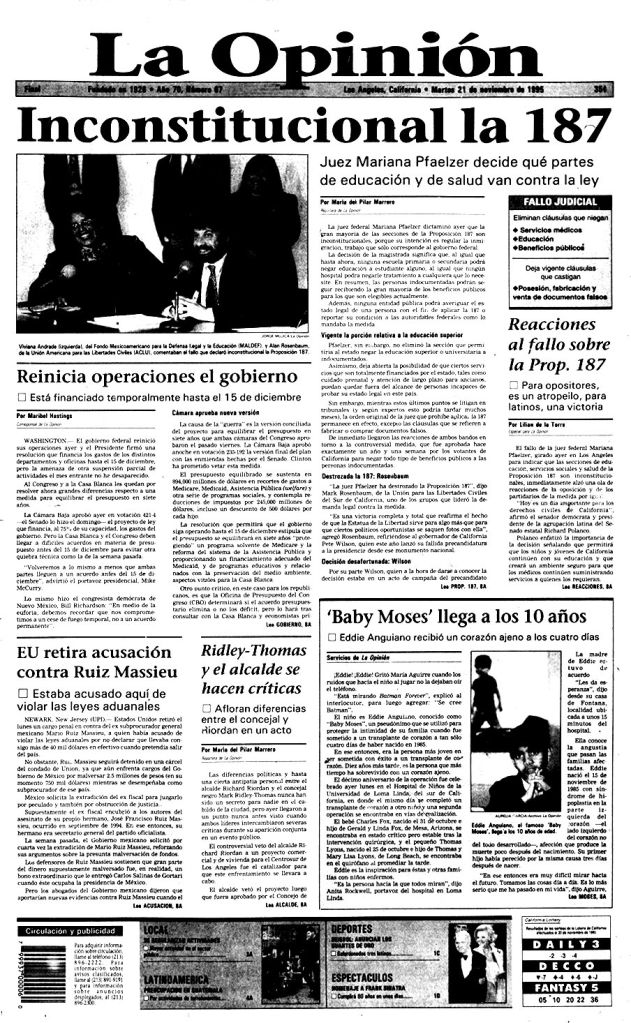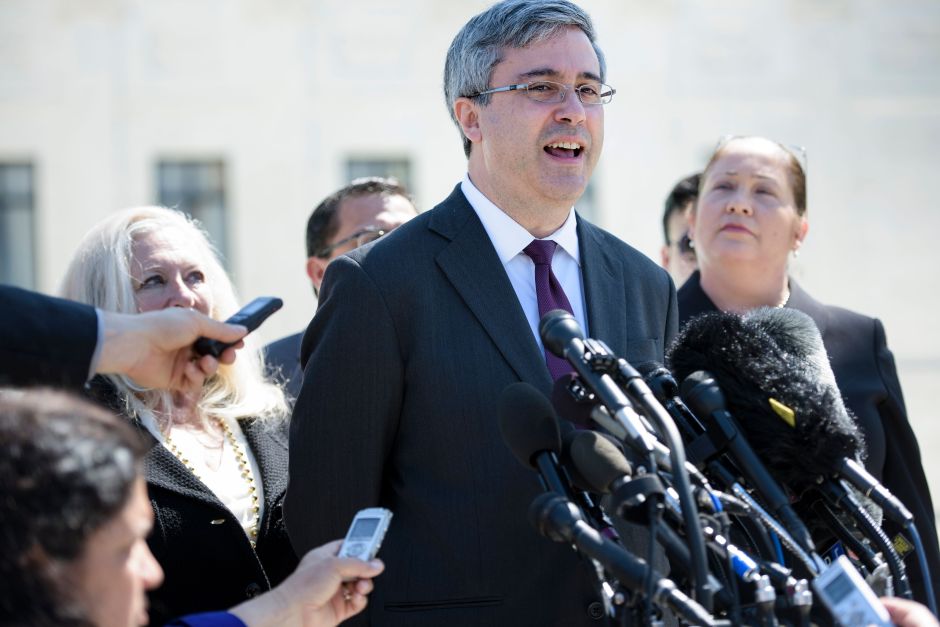The president and general counsel of MALDEF recalls how they could legally overcome Proposition 187 of Pete Wilson; "Trump will find it very difficult to be reelected," he emphasizes.
 Thomas Sáenz, President and General Counsel of the FMexican American Law on Legal Defense and Education (MALDEF), told La Opinion that California has largely changed the reaction of the people against former Republican governor Pete Wilson and Proposition 187.
Thomas Sáenz, President and General Counsel of the FMexican American Law on Legal Defense and Education (MALDEF), told La Opinion that California has largely changed the reaction of the people against former Republican governor Pete Wilson and Proposition 187.
However, he acknowledged that now – at the national level -, important challenges are faced with an “anti-Latin” administration of President Donald Trump, but that, at the same time, has influenced the election of more Latino representatives in the governmental spheres and in the Registration of more voters.
Indeed, according to the Pew Hispanic Center, 32 million Hispanics are projected to be eligible to vote in November 2020. They will be approximately 13.3% of the electoral roll, which would make them the largest racial or ethnic minority of the electorate for the first time. Once in the history of the United States.
"In a quarter of a century, California has changed the ability to stop Proposition 187 in the courts, ” said Sáenz. "It was essential to have stopped it because it would affect many people, but it also caused a profound change at the political level."
Sáenz, a leading civil rights lawyer in the United States, told La Opinion that not only in California there have been intense attacks against the immigrant community, particularly Latinos, but also in Arizona and Texas.
"The most recent examples are of politicians who exploit the demographic fear of political gains ”, added the lawyer. “Pete Wilson did it in his eagerness to re-election.
In Arizona, the SB1070 or “Law of Hate” Act of 2010 by Senator Russell Pearce, endorsed by Sheriff Joe Arpaio and enacted by former Republican Governor Jan Brewer was almost dismantled by the courts. It limited, but did not eliminate the way in which the police can apply it and that law enforcement officials ask about the legal status of people during routine stops.
In Texas, the Republican governor signed in May 2017 the SB4 law that ended the “sanctuary cities” and allowed local officials to question the immigration status of people being detained. It also punishes municipal governments, sheriffs, police chiefs and community leaders who do not cooperate with "migra". They could be charged with a misdemeanor, go to jail and even face fines of between $ 1,000 and $ 25,000.
In March 2018, the Fifth Circuit of Appeals in New Orleans again ruled that most of the law, with the exception of a party that punishes officials who "back up" the sanctuary city policies, could take effect while the case be pending.
MALDEF demand
In 1993, when Sáenz joined MALDEF as a lawyer, one of his first cases was to sue the state of California for Proposition 187, which was approved in 1994 to prevent undocumented immigrants from accessing public services.
The initiative prohibited education, most health services and other state-funded services to undocumented immigrants. It also required that all service providers report the alleged to the office of the California Attorney General of that time, Dan Lungren, and the federal immigration authorities.
MALDEF, the American Civil Rights Union (ACLU) and other immigrant advocacy organizations sued California and blocked the implementation of the proposal, except for the falsification of state documents, which would be considered a felony.
further, in July 1995, Judge MAriana R. Pfaelzer of the Court of Appeals confirmed the initial decision to block the entry into force of Proposition 187.
"The proposal had numerous constitutional problems, ”recalled Sáenz. "I doubted it would ever be implemented."
California intended to apply immigration laws that are only federally competent. It was never fully implemented.
By 1999, the new California Democratic governor, Gray Davis wanted to end the legal battle over the measure and sought a compromise between supporters and opponents.
But Sáenz and numerous lawyers asked the state to abandon any attempt to defend the controversial law.
Davis and the state withdrew the appeal Y permanently blocking Proposition 187.
"My personal reaction to the (permanent) restraining order was a feeling of relief for the damage it could have caused to children and all migrants if it was implemented, ”said Saenz. “The damage would be in schools, in obtaining the most basic services they needed; the same that we now see with the public charge and beyond that ”.
Despite having defeated Proposition 187, the lawyer acknowledged that no one predicted that at the national level the intense offensive against the Latino and immigrant community would occur as happens with the administration of President Donald Trump.
"In many ways it was unlikely to happen; nobody even expected (Donald Trump) to be elected, ”he said. “With leadership in Congress, the Republican party may not survive (in the 2020 presidential election); it may be that the consequences are the same in Arizona and other 'Latino' states like Colorado or Nevada where Republicans are in trouble with the Latino community, and, unless they quickly change ideas about Donald Trump's cruel policies, it will be very difficult to be reelected ”.







